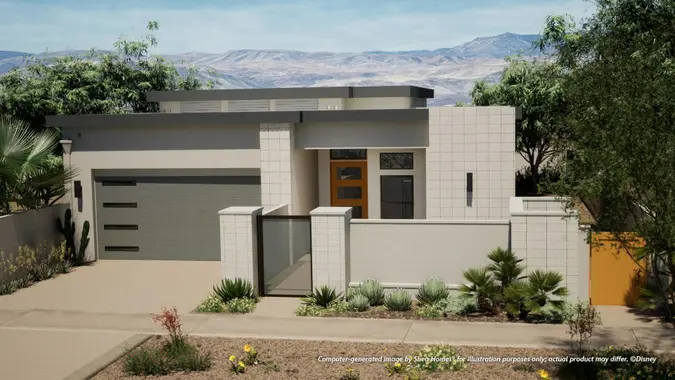How To Buy a Foreclosed Home and Save Money in 2025

Commitment to Our Readers
GOBankingRates' editorial team is committed to bringing you unbiased reviews and information. We use data-driven methodologies to evaluate financial products and services - our reviews and ratings are not influenced by advertisers. You can read more about our editorial guidelines and our products and services review methodology.

20 Years
Helping You Live Richer

Reviewed
by Experts

Trusted by
Millions of Readers
With home prices near all-time highs, many would-be buyers have been priced out of the market. For them and anyone else looking for a potential bargain, a foreclosed home could be the solution.
Foreclosures are homes that have been repossessed by lenders because the homeowners defaulted on their mortgage loans. Although foreclosure rates are low, amounting to less than 0.25% of home loans in 2024, you can still find these homes from several different sources, and at various stages in the foreclosure process.
Why Buy a Foreclosed Home?
Foreclosure puts the lender in the difficult position of having to secure and preserve the home until it can be sold. Lenders aren’t in the business of managing or selling real estate, and they want compensation for the unpaid loans. So they’re sometimes willing to accept less than full market value to sell foreclosed homes quickly.
How much less they’re willing to accept depends on the market. During the mortgage crisis that triggered the Great Recession, foreclosures flooded the market to the point that supply far exceeded demand. That drove down prices on foreclosures and on home values in general.
Buying a Home in 2025
In 2025, demand for homes exceeds supply. Prices are high and bargains are fewer and farther between. Demand isn’t the only factor guiding price.
Depending on where the home is in the foreclosure process, the buyer must either purchase it sight unseen — except to drive by — or in as-is condition, with no claims made as to condition and limited or no warranty against liens and other potential title issues. Foreclosure pricing often reflects those challenges.
Understanding the Foreclosure Process
The foreclosure process begins with a series of notifications to the borrower who is behind in their mortgage payments.
The notices typically begin after the third missed payment, and foreclosure usually begins after the homeowner has missed six payments and been unable to work out an arrangement with the lender that would allow them to remain in the home.
At this point, the home is in preforeclosure — it hasn’t been foreclosed on yet, but it’s moving in that direction.
The next step depends on what state the home is in and the types of foreclosures that are allowed or required there. There are three types:
1. Judicial Foreclosure
The lender sues the borrower in court for the back payments. If the borrower is unable to pay within 30 days or whatever time specified by the court, the house goes up for auction.
2. Statutory Foreclosure
If the mortgage has a “due on sale” clause allowing the lender to demand payment in full if the borrower defaults on the loan, the home goes to auction without a court proceeding.
3. Strict Foreclosure
This is a less common type, used when the borrower owes more than the home is worth. The lender sues the borrower in court and then takes possession if the borrower doesn’t pay by the deadline. The property is then a bank-owned, or real estate-owned, property.
How long it takes for the foreclosure to play out depends on the type of foreclosure and the jurisdiction, but it could be anywhere from a few months to a year or more.
Types of Foreclosures
Each phase of foreclosure presents opportunities to buy a home at a discount.
Preforeclosure
At the preforeclosure stage, the borrower still owns the home and is looking for a way to avoid foreclosure. Time is of the essence in this case, so the seller might be willing to accept less than they could get if they weren’t distressed.
Short Sale
A preforeclosure sale doesn’t involve the lender unless the house is worth less than the homeowner owes on the mortgage. In that case, the owner needs the lender’s permission to sell short, i.e., for a price that won’t cover the loan balance. The homeowner submits offers to the lender, and the lender decides which one, if any, to accept.
The lender makes short-sale-related decisions in its own time, which could mean days, weeks or, more likely, months. Short sales therefore can be frustrating for both the buyer and the seller.
Auction
If the home doesn’t sell pre-foreclosure, it goes to auction.
The auction in a judicial foreclosure is a “courthouse steps”-type auction sale held by a county court or sheriff’s office. If a buyer wins the auction, the home is theirs, but they must pay for it with cash or guaranteed funds. If the lender wins the auction, the home becomes an REO property and is listed for sale on the open market.
The auction for a statutory foreclosure works similarly to a judicial foreclosure auction except that a trustee, and not a sheriff or court, holds the auction.
Auction sales are especially risky because you have to buy the homes sight unseen. Although you can drive past to see what the outside looks like from the street, you can’t tour the home or have it inspected until after you’ve purchased it.
Real Estate Owned
REO sales work in much the same way as any other home purchase except that the homes are sold as-is, and the lender that owns the property won’t provide condition disclosures or warranties regarding title. Those are issues you tackle after your offer has been accepted and you begin working toward closing.
Steps To Buy a Foreclosed Home
Follow the steps listed below to find foreclosures and possibly get a great deal on a home.
1. Find Foreclosed Properties
Real estate auctions are public information, so you’ll find them listed in newspaper legal notices, on your county website or at the courthouse. Several websites, including RealtyTrac, have databases of auction listings from across the country in case you want to expand the search outside of your local area.
REO properties are listed in the local multiple listing service your real estate agent likely subscribes to, and you can view consumer versions of the listings on real estate portals like Realtor.com and Zillow. The following sources also list foreclosures:
- Fannie Mae HomePath
- Freddie Mac HomeSteps
- U.S. Department of Housing and Urban Development Hud Homes
In most cases, you’ll need a real estate agent to submit your offer on a foreclosure.
2. Research Properties
Unless you’re planning to bid on an auction property, you’ll likely tour a foreclosure before making an offer on it. In addition to verifying that you like the home, this is your chance to get a sense of its condition. Local tax and building permit records might provide additional useful information.
3. Get Pre-Approved for a Mortgage
You’ll need cash for an auction purchase or an REO home in bad shape, but many REO properties can be financed with a mortgage loan.
4. Make an Offer or Bid on the Home
If you’re trying to buy at auction, you’ll need to register and place a bid. For an REO foreclosure, you prepare an offer and your agent submits it on your behalf. The home will be offered as-is, but if you want the option to back out if the home turns out to be in worse condition than you realized, make your offer contingent on acceptable inspection results.
5. Inspect the Home
After your offer has been accepted, order your inspections before the deadline specified in your sales agreement. If the home has been winterized or utilities have been turned off, or both, you’ll have to pay for de-winterization and to reconnect services before the inspection.
6. Finalize the Purchase
After you’ve accepted the inspection results, work through the rest of the tasks needed to close the sale. They include applying for your mortgage loan, ordering the title search and purchasing title insurance.
How To Buy a Foreclosed Home Without Cash
You’ll have to pay cash for a foreclosed home at auction or an REO property that is in poor condition to qualify for financing. Otherwise, you can use the same types of mortgage loans you’d use for a non-foreclosed property, including conventional, FHA and VA mortgage loans. Although you need a down payment for conventional and FHA loans, you can purchase a home with a VA or USDA loan with no money down.
If you want to use an FHA loan for a property that doesn’t meet HUD’s quality standards, you might consider using a 203(k) rehab loan, which does double duty as a purchase loan and a rehab loan.
Financing the purchase lets you buy more house than you could afford if you had to pay cash. On the downside, loan fees, loan interest and other expenses will drive up the total cost of your purchase.
Risks and Challenges of Buying a Foreclosed Home
Foreclosures are often, but not always, in rougher shape than otherwise comparable non-foreclosures, and they also might have title issues that need to be resolved — unpaid taxes, for example. The biggest challenge, though, often comes from other buyers looking for a bargain. The higher the demand for a home, the less likely you are to get it for less than its market value.
Tips for Successfully Buying a Foreclosed Home
The right strategy can help you find a foreclosure and purchase it with minimal stress.
- Work with an agent who knows your market and has experience navigating foreclosures.
- Learn about the market before you start touring homes.
- Set a budget and stick to it.
- Make your offer contingent on getting financing and a satisfactory inspection report.
- Get a professional home inspection by a licensed inspector after your offer has been accepted.
- Purchase your title insurance in addition to the insurance your lender will require you to purchase on its behalf. This insurance is your only protection against title defects revealed after closing.
What To Do After Buying a Foreclosed Home
If you’re lucky, you won’t have to do anything with your new home other than clean it up, add your own personal touches and work routine maintenance costs into your budget. If you’re an investor, or if the home needs repairs or renovations, you’ll have to collect estimates and create a budget and timeline for the work. Once the work is finished, you’re ready to flip it for a profit or rent it out to tenants if you don’t plan to live there yourself.
Conclusion
For homebuyers looking for discounted properties, foreclosures can be a good choice. Although they’re often in less-than-pristine condition, and details about the condition are limited or nonexistent, buyers willing to learn about the process and perform due diligence can overcome the surprises and challenges inherent in foreclosure sales.
FAQs on Buying a Foreclosed Home
Here are the answers to some of the most frequently asked questions about buying a foreclosed home.- Can I buy a foreclosed home with bad credit?
- Yes, as long as you can pay cash. Otherwise, you might find high-interest alternative financing, but your best bet is to hold off on buying until your credit has improved enough to qualify you for a standard mortgage loan.
- How long does it take to buy a foreclosed home?
- Timelines vary. At best, you can close in the same six to seven weeks it takes to close on a non-foreclosure. But under some circumstances, it can take months.
- What happens if there are unpaid liens on a foreclosed home?
- Unpaid liens are usually eliminated by the foreclosure, but owner's title insurance will protect you against unexpected title defects revealed after you close.
- Are foreclosed homes in good condition?
- Every foreclosed home is different. Some are in excellent condition, while others need extensive repairs.
Our in-house research team and on-site financial experts work together to create content that’s accurate, impartial, and up to date. We fact-check every single statistic, quote and fact using trusted primary resources to make sure the information we provide is correct. You can learn more about GOBankingRates’ processes and standards in our editorial policy.
- LendingTree. "Despite Housing Market Concerns, Foreclosures Remain Rare."
- Statista. "Foreclosure rate in the United States from 2005 to 2024."
- Rocket Mortgage. 2025. "Buying A Foreclosed Home: Pros, Cons And A Step-By-Step Guide."
- Quicken Loans. 2024. "How To Buy A Foreclosed Home In 7 Steps."
- Freddie Mac. 2024. "What You Should Know About Buying a Home in Foreclosure."
- Bank of America Foreclosures. "How to Buy a Foreclosed Home."
- Chase Mortgage. "Foreclosures and REO Properties."
- U.S. Department of Housing and Urban Development. "Understanding Mortgage Foreclosures."
 Written by
Written by  Edited by
Edited by 

























